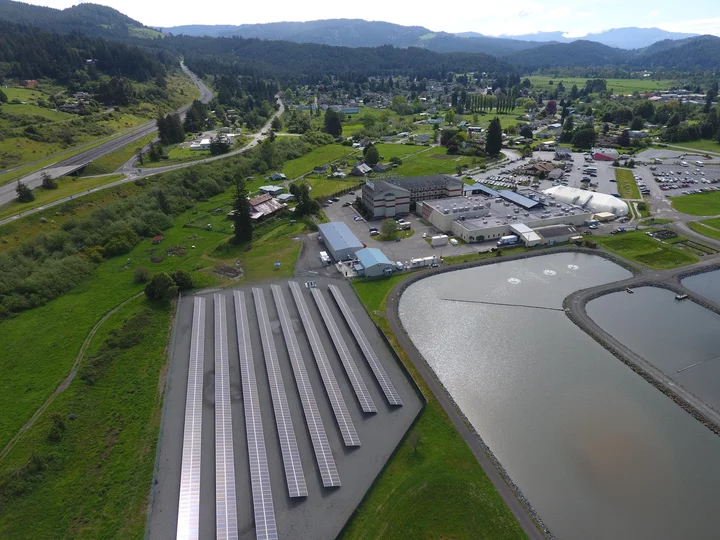The Blue Lake microgrid. Image: Blue Lake Rancheria.
###
PREVIOUSLY:
###
Press release from the Redwood Coast Energy Authority:
On October 2, the U.S. Department of Energy (DOE) announced the termination of 321 financial awards supporting 223 projects nationwide. Among the rescinded awards is the Tribal Energy Resilience and Sovereignty (TERAS) Project, a regional initiative led by the Blue Lake Rancheria Tribe, Hoopa Valley Tribe, and Yurok Tribe, in partnership with the Redwood Coast Energy Authority (applicant), the Schatz Energy Research Center (project design and development lead), and Pacific Gas and Electric Company (local utility).
In January 2025, RCEA entered into a conditional award agreement with DOE’s Grid Resilience Innovations Program for $87.6 million to support TERAS. The funding was intended to build a network of Tribally owned and operated community microgrids designed to address persistent power reliability issues across Northern California’s rural and mountainous terrain. While DOE has not directly notified RCEA of a change in award status, the TERAS project appeared on a circulated list of terminated projects.
“RCEA is very concerned with the reports that the Department of Energy has plans to terminate the TERAS project,” said Eileen Verbeck, Deputy Executive Director of RCEA. “We remain hopeful that the federal government will continue to support this project, but in the event of termination, we will pursue alternative funding to ensure the successful completion of this critical work.”
The TERAS project is designed to support more than 140 miles of power lines on the Hoopa 1101 circuit, which experiences some of the most frequent and longest-duration power outages in the state. This electricity circuit serves communities along the Trinity and Klamath Rivers — including Hoopa, Weitchpec, and Orleans — which are home to essential government services for the Hoopa Valley, Yurok, and Karuk Tribes. Already, Tribal Nations pay 56% higher electricity prices than the U.S. average and experience 6.5 times more outages. Along the Hoopa 1101 circuit, families and Tribal facilities currently experience dozens of outages each year, which take their local water, critical communication, and health systems offline, increase the risks to elders during heat waves and freezing weather, interfere with classroom education and information access, and cause a significant loss in stored food and other supplies.
The TERAS project leverages local renewable energy generation, battery storage, and advanced grid control systems to strengthen Tribes’ energy independence, providing power to critical health and public safety needs. The Blue Lake Rancheria Tribe’s nationally recognized microgrid system would serve as the pilot site for new technologies, providing a model for other rural and Tribal communities facing similar challenges nationwide.
[DISCLOSURE: The Blue Lake Rancheria is a minority owner of the Outpost’s parent company, Lost Coast Communications, Inc.]
“We are deeply disappointed by this news, as the TERAS project represents years of technical design, multi-tiered partnership, and extensive regulatory and policy review,” said Linnea Jackson, General Manager of the Hoopa Valley Public Utilities District. “Most importantly, TERAS will provide critical energy resiliency in our remote region of Northern California, where reliable power is a daily necessity for health, safety, and community well-being. The Hoopa Valley Tribe remains strong and steadfast in pursuing other solutions and pathways to ensure this project moves forward and our people have the resilient energy systems they deserve.”
Despite the federal uncertainty, the TERAS team affirmed its unified commitment to advancing the project. Philanthropic and purpose-driven partners now have a unique opportunity to help advance a first-of-its-kind, scalable model for community-owned microgrids that can be replicated in other regions facing climate and infrastructure challenges.
About the TERAS Project
The Tribal Energy Resilience and Sovereignty (TERAS) Project is a multi-Tribe, multi-partner initiative to design, build, and operate a network of community microgrids in Northern California. The project combines innovative and proven technologies to deliver clean and reliable power, strengthen Tribal sovereignty, and create a scalable model for energy resilience in rural and Indigenous communities across the country.

CLICK TO MANAGE